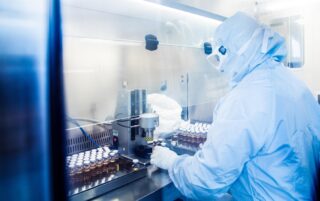
Symbiosis has a proven track record of supporting GMP aseptic fill-finish for recombinant proteins and monoclonal antibody manufacturing.

Over the past 40 years recombinant proteins have risen to become a core part of the therapeutic landscape. From relatively small hormones, to large and complex monoclonal antibodies (mAbs), the manufacturing process is now well characterised and well understood.
However, consideration must still be given to how the therapy will be delivered to the patient and therefore what the final product format will be.

Symbiosis has extensive experience in delivering many hundreds of clinical projects related to mAbs and recombinant proteins. We can support your clinical trials.
Recombinant proteins are predominantly synthesised by utilising a manufacturing cell line. Manufacturing cells lines can range from bacteria to yeast and from insect to avian. However, the most common production cell line, especially for large proteins like mAbs is the mammalian CHO (Chinese Hamster Ovary) cell. Some ex-cellular manufacturing processes exist, but do not have wide scale commercial application.
The manufacturing cell line is modified to include a genetic sequence which instructs the cell to produce the protein of interest. These proteins can be used for a range of therapeutic applications, such as hormones, blood factors and enzymes. Recombinant proteins can also be used in vaccines.
Heterogeneous (or polyclonal) antibody therapies have been used for over a century in the treatment of bacterial infections and as an antivenom. It was not until the late 20th century where recombinant technology became developed enough to allow for the production of highly specific monoclonal antibodies (mAbs). Examples of where mAbs can be used are in cancer, autoimmune conditions and viral infection therapies.